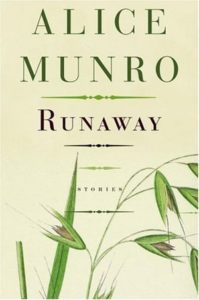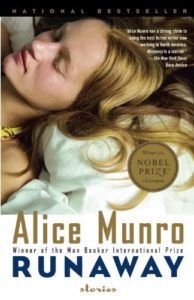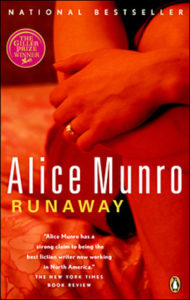
Read Jonathan Franzen's ode to Alice Munro.
Canadian Nobel laureate Alice Munro celebrates her 92nd birthday today.
Widely regarded as one of our greatest living writers and a consummate master of the short story, Munro’s collections have earned her more prestigious literary awards than you can shake a maple leaf at, including three Governor General’s Awards, two Giller Prizes, the PEN/Malamud Award for Excellence in Short Fiction, and the National Book Critics Circle Award for fiction, to name but a few.
Back in 2004, Jonathan Franzen reviewed her eleventh short story collection, Runaway, with this passionate ode to the short story, and to Munro’s work as an exemplar of the form.
Enjoy!

Few people, very few, have a treasure, and if you do you must hang onto it.
You must not let yourself be waylaid, and have it taken from you.
“Alice Munro has a strong claim to being the best fiction writer now working in North America, but outside of Canada, where her books are No. 1 best sellers, she has never had a large readership. At the risk of sounding like a pleader on behalf of yet another underappreciated writer—and maybe you’ve learned to recognize and evade these pleas? The same way you’ve learned not to open bulk mail from certain charities? Please give generously to Dawn Powell? Your contribution of just 15 minutes a week can help assure Joseph Roth of his rightful place in the modern canon?—I want to circle around Munro’s latest marvel of a book, Runaway…
…
“…when I close my eyes and think about literature in recent decades, I see a twilight landscape in which many of the most inviting lights, the sites that beckon me to return for a visit, are shed by particular short stories I’ve read.
I like stories because they leave the writer no place to hide. There’s no yakking your way out of trouble; I’m going to be reaching the last page in a matter of minutes, and if you’ve got nothing to say I’m going to know it. I like stories because they’re usually set in the present or in living memory; the genre seems to resist the historical impulse that makes so many contemporary novels feel fugitive or cadaverous. I like stories because it takes the best kind of talent to invent fresh characters and situations while telling the same story over and over. All fiction writers suffer from the condition of having nothing new to say, but story writers are the ones most abjectly prone to this condition. There is, again, no hiding. The craftiest old dogs, like Munro and William Trevor, don’t even try.

“Here’s the story that Munro keeps telling: A bright, sexually avid girl grows up in rural Ontario without much money, her mother is sickly or dead, her father is a schoolteacher whose second wife is problematic, and the girl, as soon as she can, escapes from the hinterland by way of a scholarship or some decisive self-interested act. She marries young, moves to British Columbia, raises kids, and is far from blameless in the breakup of her marriage. She may have success as an actress or a writer or a TV personality; she has romantic adventures. When, inevitably, she returns to Ontario, she finds the landscape of her youth unsettlingly altered. Although she was the one who abandoned the place, it’s a great blow to her narcissism that she isn’t warmly welcomed back—that the world of her youth, with its older-fashioned manners and mores, now sits in judgment on the modern choices she has made. Simply by trying to survive as a whole and independent person, she has incurred painful losses and dislocations; she has caused harm.
And that’s pretty much it. That’s the little stream that’s been feeding Munro’s work for better than 50 years. The same elements recur and recur like Clare Quilty. What makes Munro’s growth as an artist so crisply and breathtakingly visible—throughout the Selected Stories and even more so in her three latest books—is precisely the familiarity of her materials. Look what she can do with nothing but her own small story; the more she returns to it, the more she finds.

“More than any writer since Chekhov, Munro strives for and achieves, in each of her stories, a gestaltlike completeness in the representation of a life. She always had a genius for developing and unpacking moments of epiphany. But it’s in the three collections since Selected Stories (1996) that she’s taken the really big, world-class leap and become a master of suspense. The moments she’s pursuing now aren’t moments of realization; they’re moments of fateful, irrevocable, dramatic action. And what this means for the reader is you can’t even begin to guess at a story’s meaning until you’ve followed every twist; it’s always the last page or two that switches all lights on.
Meanwhile, as her narrative ambitions have grown, she’s become ever less interested in showing off. Her early work was full of big rhetoric, eccentric detail, arresting phrases. (Check out her 1977 story ‘Royal Beatings.’) But as her stories have come to resemble classical tragedies in prose form, it’s not only as if she no longer has room for inessentials, it’s as if it would be actively jarring, mood-puncturing—an aesthetic and moral betrayal—for her writerly ego to intrude on the pure story.
Reading Munro puts me in that state of quiet reflection in which I think about my own life: about the decisions I’ve made, the things I’ve done and haven’t done, the kind of person I am, the prospect of death. She is one of the handful of writers, some living, most dead, whom I have in mind when I say that fiction is my religion. For as long as I’m immersed in a Munro story, I am according to an entirely make-believe character the kind of solemn respect and quiet rooting interest that I accord myself in my better moments as a human being.
But suspense and purity, which are a gift to the reader, present problems for the reviewer. Basically, Runawayis so good that I don’t want to talk about it here. Quotation can’t do the book justice, and neither can synopsis. The way to do it justice is to read it.”
–Jonathan Franzen, The New York Times Book Review, November 14, 2004
Dan Sheehan
Dan Sheehan is the author of the novel Restless Souls (Ig Publishing) and Editor-in-Chief of Book Marks.



















